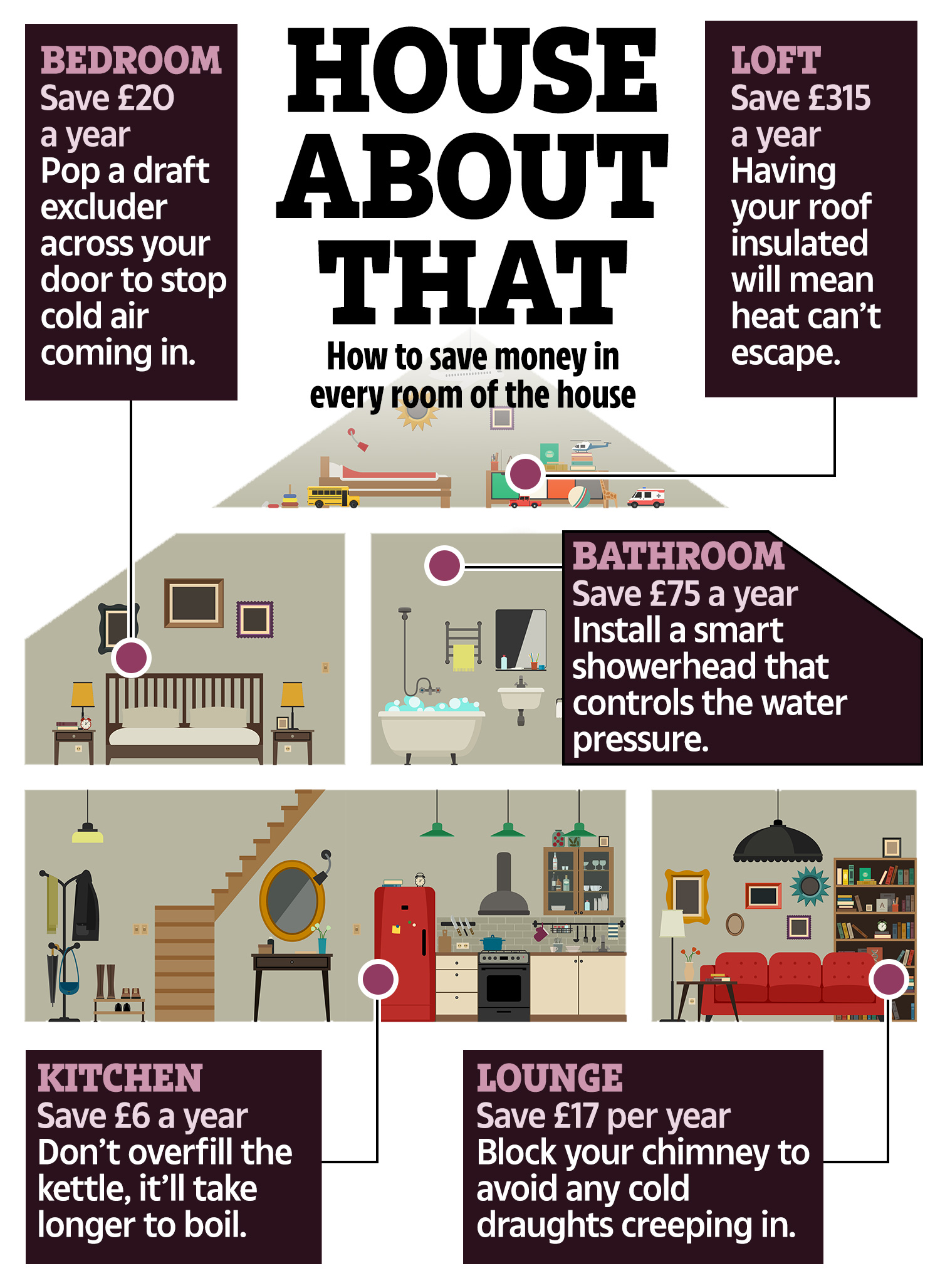HOUSEHOLDS are feeling the pinch when it comes to the cost of energy in the home.
We recently revealed that cash-strapped Brits have had to fork out up to a quarter more than usual on their energy bills, as the cost of living starts to bite.
Energy firms have been slammed for ramping up household bills by as much as 80% amid rising gas prices.
Since August, wholesale gas prices have gone up a staggering 70%, leaving many suppliers facing going bust.
We’ve also seen it in the rise of the energy price cap that went up from £1,138 a year to £1,277 at the start of October, adding £139 to customers’ bills.
But it’s meant many households have been forcibly moved to new tariffs that are far dearer in some cases than they were paying previously.
Understandably, many people will looking for any way they can to cut the costs of these newly hiked bills.
The good news is you can make a number of small changes around your whole home to lower your charges.
Take a look at how much energy you use when you move from room to room, and work out a plan to minimise what you’re spending with the help of some of our trusty tips and tricks.
Here’s how you can be energy savvy in every room of your house:
Cut costs in the kitchen
Use the correct hob ring for your pan
Use the correct sized ring for the pan you’re cooking with to avoid any excess heat escaping.
If you can see any of the electric ring, or any gas flames, then that means the heat is working hard for nothing, heating the air rather than the pan itself.
The Telegraph reports that placing a 15cm pan on a 20cm ring could be wasting as much as 25% energy.
Don’t let your freezer get iced up and don’t overcrowd it
If you don’t defrost your freezer regularly it could add as much as £150 a year to your bill.
This keeps the temperature low so the motor doesn’t have to work as hard.
Also when you have too much food in your fridge or freezer, the appliance struggles to keep the items of food cold, and uses more energy as a result.
Don’t leave the oven on longer than you have to
You should turn off the oven a few minutes before food is ready, leaving it to continue cooking in what’s left of the heat.
It’s going to take a while to cool down anyway, and that extra heat is just going to waste.
You can also get away with not preheating the oven in most cases too.
Most ovens are quick to heat up nowadays so you could just be wasting excess energy.
Use the microwave instead
Sometimes using the microwave is cheaper than the oven.
Gas stoves use more energy than microwaves so especially if you are reheating food, you can use less energy over a shorter period to get the same result.
Things like jacket potatoes will be cheaper to cook in the microwave too given they’ll only need a quick blast compared to the lengthy time they take to bake in the oven.
Don’t overfill your kettle
Avoid overfilling the kettle and boiling more water than you need.
It just means the kettle will be boiling for longer when you won’t come to use the water that’s been heated.
Tashema Jackson, consumer champion at energyhelpline said: “Adjusting how much water you use and the temperature you boil your water to, can save you around £6 a year.”
Halve your spends in the hallway
Use draught excluders
Stopping heat from escaping through unwanted gaps around doors and windows could help you save around £20 a year according to Which?.
You can also spend as little as £3 draught-proofing you home and shave over £200 off your energy bills over a five year period.
Draughts or gaps around your doors and windows act as unwanted ventilation shafts so block these with plush excluders or specially created tape that works in the same way.
Switch off appliances and the WiFi
Switch off devices you might have plugged in along your landing or hallway, including the WiFi.
If you leave them on standby they will continue to use power around your house, so unplugging appliances from the walls will guarantee you can’t waste any unnecessary energy.
Will Owen, energy expert at Uswitch said: “The Energy Saving Trust estimates you can save around £35 a year by remembering to turn your appliances off properly, and not leaving them in standby mode.”
Budget for the bedroom
Install a dimmer switch on your lights
Using a dimmer switch allows you to turn the lights down so they are not operating at full power for longer than necessary.
You won’t use as much energy lighting your home as a result.
Use energy-saving light bulbs
If you don’t necessarily need as much bright light somewhere like the bedroom you can install energy-saving light bulbs which could cost £180 from your energy bills compared to older style bulbs.
An LED light bulb costs around £1.71 a year to run, which could take some of the pressure off the household budget.
Don’t break the bank in the bathroom
Install a smart showerhead
Installing a new smart showerhead is a great way to reduce your energy bill and conserve water too.
You’ll be able to control the water pressure and set the exact temperature you want the water to run at which will stop you from wasting any excess energy.
Tashema Jackson, from energyhelpline said: “Manufacturers say that using a smart shower can save you up to £75 a year on your water and energy bills.”
Shower, don’t bathe
If you’re usually a fan of a long soak, you might have to switch to taking showers instead, particularly if they’re short ones.
A shower will use much less hot water and spending less time in the shower will also save money on your energy, and also reduce your water bills if you are on a meter.
Lower costs in the lounge
Position your furniture right
Where your furniture sits in the room actually plays a key role in how much energy you’ll use to heat it.
Any furniture covering a radiator will prevent heat from travelling around the room.
However, if you have your sofa up against an external wall, you’ll feel the chill more.
If you position your furniture more centrally in the room you might find you’re less inclined to whack the heating up.
Bleed your radiator
If your radiator isn’t heating up properly you may need to bleed it.
There’s usually an issue when air is trapped inside, this can stop the
warm water from properly circulating your radiator and means it takes a lot longer to heat up the room, using more energy in the process.
You should bleed all your radiators at least once a year.
You can use a radiator key to turn the valve on the top of the radiator to relieve the trapped air, and it will probably result in a hissing sound and water might start to leak out too before you retighten the valve.
When it comes to heating your home you can apply for discounts and grants like the warm home discount scheme too, to help with the inevitable costs you will still have to face.
Block your chimney
The chimney is another location you’ll find heat can easily escape.
Michael Reading at Housetastic said: “Blocking a chimney can
be the only viable option in these circumstances, however you must be careful to do this properly.
“Never seal off the top of the chimney, especially if you do use
your fireplace, as this will seal the heat inside the chimney and can cause extreme overheating.”
“If your fireplace is out of use, then a temporary cover for it should help retain the heat inside while keeping the draughts away from circulating the
room.”
According to Energy Saving Trust installing a form of draft excluder in your chimney could save you £17 per year too.
Lay down a rug
If your floor isn’t insulated it can account for up to 10% of your home’s heat loss, especially if it’s wooden flooring.
Adding an extra layer, especially of something in a cosy material, like a rug, can not only cover over gaps you might find in the flooring but also prevent some warm air from escaping.
Spend less in the loft
Insulate the loft
If you insulate your loft and cavity walls you can save you up to £315 a year according to Which?.
Hundreds of thousands of people overpay by £246 on heating bills due to poor insulation, but you can fix that and reduce costs.
You don’t necessarily have to splash out on the costs alone either, as low-income households can make their homes more energy efficient with grants of up to £10,000 from councils to install things like insulation.
We pay for your stories!
Do you have a story for The Sun Online Money team?
Email us at money@the-sun.co.uk





